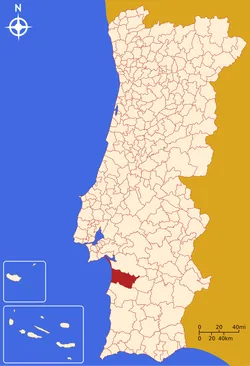

Setubal and Grandola in Portugal: History & Features
Discover the rich history and unique features of Setubal and Grandola, Portugal. Explore what makes these cities special and learn about their captivating past.
Grândola, Setúbal: A Hidden Gem of Portugal
Mycarro AI
May 3, 2025
Introduction to Grândola
Nestled in the heart of the Alentejo region, Grândola is a charming town in Portugal's Setúbal District. Known for its rich history, warm community, and stunning surrounding landscapes, Grândola captivates visitors not just with its picturesque views but also with its cultural significance. This town, with a population of roughly 6,000 inhabitants, offers a unique glimpse into both traditional Portuguese life and the sweeping changes that have shaped modern Portugal.
Historical Significance
Grândola's history is deeply intertwined with Portugal's cultural evolution. The town is famously associated with the Carnation Revolution, the peaceful coup that ended the dictatorship in 1974. The song "Grândola, Vila Morena," performed by singer José Afonso, became an anthem for those fighting for freedom, symbolizing unity and resistance against oppression. Today, the town proudly commemorates this revolutionary past, marked by various memorials and cultural events that celebrate its role in the fight for democracy.
Cultural Richness
Grândola thrives on cultural diversity and community spirit. The town hosts numerous festivals throughout the year, richly blending music, cuisine, and traditional crafts. The Festa de São Sebastião, celebrated in January, and the Festa de Nossa Senhora da Graça, held in September, both showcase the vibrancy of local traditions. Visitors can savor authentic Alentejan dishes, renowned for their use of high-quality local ingredients such as bread, olive oil, and cheese. The warm hospitality of Grândola's residents ensures that every visitor feels welcomed.
Natural Beauty
Encircled by stunning natural landscapes, Grândola serves as a gateway to the Alentejo's breathtaking scenery. The nearby Costa da Caparica boasts extensive sandy beaches ideal for sunbathing, surfing, and nature walks. Additionally, the surrounding hills and vineyards appeal to outdoor enthusiasts and those seeking tranquility. The region is also home to the Natural Reserve of Sudoeste Alentejano e Costa Vicentina, where one can witness diverse flora and fauna. This area's scenery is a paradise for hikers, offering spectacular views and a chance to disconnect from the fast-paced world.
Architectural Marvels
The architecture in Grândola reflects its historical and cultural heritage. Visitors can admire the iconic Church of Our Lady of Grace (Igreja de Nossa Senhora da Graça), whose beautiful façade and interior decorations narrate stories of the past. The town is also dotted with traditional houses characterized by their whitewashed walls and terracotta roofs, adding to the charm of the streets. Wandering through Grândola feels like stepping back in time, as the town is largely unspoiled by modern development.
Economic Landscape
While agriculture is the backbone of Grândola's economy, the town is also gradually embracing tourism as a significant contributor. The picturesque landscapes, cultural festivals, and historical relevance attract visitors from around the world. Local artisans are gaining recognition for producing high-quality crafts that highlight traditional Alentejan techniques, further promoting sustainable economic growth in the region. This shift towards tourism allows Grândola to showcase its cultural wealth while preserving its local traditions.
Conclusion
In a world filled with bustling tourist traps, Grândola offers a refreshing escape into the soul of Portugal. The town's blend of history, culture, and striking natural beauty makes it a must-visit destination for those who seek authenticity. Whether you’re strolling through its historic streets, indulging in its culinary delights, or immersing yourself in the local traditions, Grândola is indeed a hidden gem waiting to be discovered.